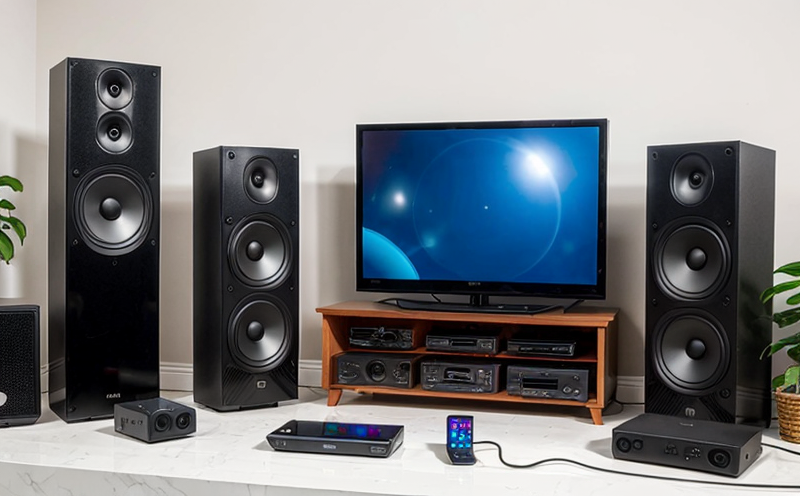RTCA DO 160 Section 25 Electrostatic Discharge Testing for Multimedia Devices
Electrostatic discharge (ESD) testing is a critical component of the RTCA/DO-160 standard, which provides guidelines for environmental conditions that may affect avionics and aerospace electronics. DO-160 Section 25 specifically addresses ESD testing to ensure electronic devices can withstand electrostatic discharges without failure.
The testing process involves subjecting the device under test (DUT) to controlled levels of ESD, simulating real-world conditions that could occur during manufacturing, transportation, or use. This section focuses on multimedia devices such as audio and video players, digital cameras, and other consumer electronics used in avionics systems.
The goal is to ensure the device maintains its functionality after exposure to ESD events. The test parameters are based on international standards, including ISO/IEC 8032-1: Electrostatic discharge immunity tests for household products - Part 1: Basic specifications and procedures.
During preparation, the DUT is placed in a controlled environment that simulates the conditions of ESD events. The device is then subjected to a series of discharges with varying magnitudes and durations. After testing, the DUT is inspected for any signs of damage or functional degradation.
The test results are documented and reported according to DO-160 guidelines. This includes recording the type and magnitude of ESD events tested, as well as any observed effects on device performance. The report serves as evidence that the device meets the specified immunity levels required for avionics applications.
Compliance with RTCA/DO-160 Section 25 is essential for manufacturers aiming to ensure their products meet stringent aerospace standards. By adhering to these guidelines, companies can enhance product reliability and reduce potential risks associated with ESD events in demanding environments.
The testing process is highly technical and requires specialized knowledge and equipment. Our laboratory ensures that all tests are conducted according to the latest international standards and best practices. This approach guarantees accurate and reliable results, providing peace of mind for quality managers, compliance officers, R&D engineers, and procurement teams involved in avionics development.
Our team of experts is well-versed in DO-160 standards and can provide guidance on test planning, specimen preparation, and interpretation of results. We offer comprehensive testing services that go beyond the basic requirements, ensuring your devices are not only compliant but also robust and reliable.
Why Choose This Test
Choosing RTCA DO-160 Section 25 Electrostatic Discharge Testing for Multimedia Devices is crucial for several reasons. Firstly, it ensures that your products meet the strictest aviation industry standards, which is essential for gaining market access in this highly regulated sector.
The test provides confidence in product reliability and durability, knowing they can withstand harsh environmental conditions. This is particularly important for consumer electronics used in avionics systems where failures could have serious consequences.
By choosing our testing services, you also benefit from expert guidance throughout the process. Our team of specialists offers comprehensive support, ensuring that your products are prepared correctly and tested according to the latest international standards. This level of expertise ensures accurate and reliable results, enhancing product performance and reducing the risk of failures in critical applications.
Compliance with DO-160 is a requirement for many aerospace companies, and choosing our laboratory can help you avoid costly rejections or delays during certification processes. Additionally, we offer additional services such as stress testing and environmental simulation to provide a holistic approach to product development and quality assurance.
In summary, selecting RTCA/DO-160 Section 25 Electrostatic Discharge Testing for Multimedia Devices is not just about meeting regulations; it's about ensuring your products are robust, reliable, and ready for deployment in demanding environments. Our comprehensive testing services provide the confidence you need to succeed in this competitive market.
International Acceptance and Recognition
The RTCA/DO-160 standard is widely recognized and accepted by major aerospace organizations and regulatory bodies around the world. It has been adopted as a key guideline for ensuring electronic equipment used in aviation meets stringent environmental conditions.
RTCA DO-160 Section 25 specifically addresses ESD testing, which is crucial for consumer electronics integrated into avionics systems. The standard is based on international standards such as ISO/IEC 8032-1, ensuring that the testing process adheres to globally recognized benchmarks.
The acceptance and recognition of DO-160 in the aerospace industry have led to its integration into various certification processes. This means that compliance with this standard can significantly streamline the qualification process for your products, reducing potential delays and costs associated with non-compliance.
By choosing our laboratory for RTCA/DO-160 Section 25 Electrostatic Discharge Testing, you ensure that your products meet these internationally recognized standards. This not only enhances product reliability but also increases marketability in the aerospace sector, where compliance is critical.
Use Cases and Application Examples
The use cases for RTCA DO-160 Section 25 Electrostatic Discharge Testing are numerous, particularly within the consumer electronics industry. Multimedia devices such as audio and video players, digital cameras, and other electronic gadgets used in avionics systems require robust testing to ensure they can withstand ESD events.
One of the primary applications is during the manufacturing process, where DUTs are subjected to controlled ESD environments to simulate real-world conditions. This helps identify any potential weaknesses or vulnerabilities before the product reaches the market.
In the field, multimedia devices in avionics systems may encounter ESD events due to handling by maintenance personnel or passengers. Testing these devices according to DO-160 ensures they can operate reliably under such circumstances.
Another important application is during transportation, where devices could be exposed to ESD events from various sources. By testing them beforehand, manufacturers can ensure that their products are resilient and dependable in transit conditions.
The test also applies to consumer electronics used in aviation by passengers or crew members. These devices must meet the same stringent standards to ensure they function correctly under all environmental conditions.
In summary, RTCA DO-160 Section 25 Electrostatic Discharge Testing is essential for ensuring that multimedia devices used in avionics systems are robust and reliable. By testing these devices according to international standards, manufacturers can enhance product performance and reduce the risk of failures in critical applications.





